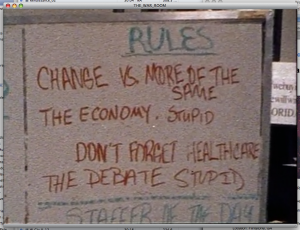Today’s Supreme Court decision that affirms most aspects of the 2010 Affordable Care Act has two main positives — besides the obvious, setting up universal, fairly priced health insurance for Americans.

The first is more micro: The worker is not as enslaved to his job now.
Over the last four or five decades, the main perquisite of full-time employment has been general health care insurance. Companies — and government agencies — found this an increasingly attractive component of a salary package. Individuals and heads of families might well reject otherwise similar job offers that have insufficient insurance.
No employee worried about paying for health care minded seeing a fair share deducted from the paycheck, with the employer picking up the balance.
The three alternatives were so far worse it limited important decisions. No insurance was a lousy bet. Paying 100 percent was out of the question for most people. Private-pay insurance cost way, way more than the similar job perk, even including both employee and employer shares (I priced this when running a bed-and-breakfast in 1998). The third option was the one many people fell to: the federal COBRA (Consolidated Omnibus Budget Reconciliation Act) plan. That came up when job-associated policies expired weeks or months after a job ended. Cobra continued most but not all of the aspects of one’s policy (medicines not included, for example), and it was far from affordable, when one was out of work.
Now, an American adult has a bit more freedom. Maybe he would like to leave the secure job and start a small business. With the Affordable Care Act, that’s more feasible (when the law goes into full effect year after next). The freelancers among us — web designers, entrepreneurs, artists, musicians, among others — can afford to create and perform, wait for better assignments, knowing that a medium accident or cancer scare won’t wreck their plans.
You get the drift.
On the macro scale, President Barack Obama’s law that was passed by both houses of Congress, by members of both parties, and affirmed by a majority of U.S. justices, will end the Good Depression (the current recession) sooner.
Republican and Democratic leaders keep hammering at job creation to pull the nation out of financial lethargy. Putting the onus of health care back on individuals (due to modest costs and mandatory federal deductions as already done for Social Security and Medicare/Medicaid) and off the backs of established businesses and start-ups, will free up both corporate capital but also open up the choices that executives make in expanding their companies.
No need to worry about the insurance industry, the good firms will make money, good money, off this. Hospitals and clinics, doctors and support staff — no halfway well-run health-care business will go bankrupt unless it wants to.
Probably, it is just that simple.
That is why health care was the third tier of James Carville’s strategy for Bill Clinton’s successful 1992 presidential campaign. Man, was that a long time ago.
The most famous rule on the whiteboard at the Little Rock headquarters of course was, “The Economy, Stupid.” (As seen in the documentary The War Room.)
These strategic points fit together. They did 20 years ago, and they do now.
